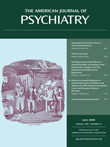I smile as I shift through my snail mail and spy the familiar small white business envelope. Each time it is the same: the envelope addressed in longhand to my large hospital, two sheets of plain unlined typing paper covered in black ink, the lines of text slanting slightly downward from horizontal. The letter has no margins, every available inch is used for script, and the last line is cramped onto the end of the page, shorter and smaller that the rest. Initially a nuisance, these communications have morphed into something far more meaningful.
I first met “Elijah” on a Tuesday morning when he was brought to the clinic by his sister. I remember it was a Tuesday because that is the morning that I take emergency call while the residents are excused from clinical duties for didactics. His sister was very concerned about his escalating psychotic symptoms, and I agreed that he needed to be hospitalized. I suspected there was more to the story, however. Elijah had immigrated to the United States some time ago, living in turn with successive siblings. Unfortunately, it had been several years since he had had psychiatric treatment. I sensed his family was spent and their secondary agenda was permanent residential placement. Indeed, after his hospitalization, he was admitted to a residential care facility nearby, and he followed up in the clinic with “Rachel,” one of my physician assistant colleagues, for medication management visits. I supervised his treatment from a distance, usually meeting with him once a year to draft a “physician generated comprehensive treatment plan,” as required by hospital guidelines. Elijah seemed to thrive at the care facility and responded well to treatment over the course of the next 3 or 4 years.
In addition to attending medication management visits, Elijah frequently corresponded with Rachel, and she shared some of his letters with me. When she left the state, his care was transferred to a psychiatrist in the community outside our clinic. In spite of knowing about her departure, Elijah continued to write faithfully twice a week. Because of my previous involvement in his care, it seemed logical for me to take over as the recipient of his letters.
At first, I read the letters out of a sense of duty. I wanted to make sure there were no psychotic, suicidal, or homicidal thoughts that I should bring to the attention of his current treating psychiatrist. After reading them, I diligently filed each letter in the medical record. However, the volume of letters eventually led the medical records department to politely request I find another solution. I agreed that I would continue to screen them and then confidentially destroy them.
As the letters kept coming, I struggled with how to respond. He was no longer a patient in our clinic, so there was no way to acknowledge and discuss his letters during his clinic visits, as Rachel had done. I could write and thank him for his letters, but I feared this would encourage an unhealthy relationship that might undermine the therapeutic bond with his current psychiatrist. I could write and ask him to stop writing, but this seemed terribly ungracious. I also did not want to negate whatever therapeutic value composing these letters had for him. I firmly believe that a physician’s most powerful therapeutic tool is relationship. Yet here I was, clearly involved in a therapeutic relationship that did not fit any of the usual paradigms. I was flummoxed and strangely intrigued.
I decided not to respond in hopes the letters would stop if they were not reinforced. As expected in dealings with people, he did the unexpected. He continued to write and I continued to read. I felt some unusual sense of engagement with this man who continued to write even after receiving no response for years. Clearly, he had faith that someone at the other end of the U.S. Postal Service chain was listening.
Today’s letter comes at one of my low ebbs, one of those days when psychiatry seems like a dismal field full of treatment-resistant patients and administrative hassles. In contrast, Elijah’s letter is full of hope. He writes of “the light which dispels darkness,” words of grace and poetry befitting his prophetic namesake. His exhortation to “be ready to help those who have sorrowful experiences” renews my purpose. He advises that “you whom they seek can do miracles for them by words of encouragement.” He describes being “so thankful for the love, care, and concern shown” to him. Maybe in spite of the obstacles and disappointments in my day-to-day practice, I’m doing some good after all.
If I’m honest, I admit that I enjoy his letters. They are an uplifting balm to my soul. They give me hope. Yet somehow I feel guilty about my enjoyment. It seems self-indulgent to admit that I value Elijah’s letters, not just for their apparent therapeutic value for him but also for their therapeutic value for me.
Over the last year, the letters have slowed to a trickle, perhaps one every few months. My lack of reinforcement seems to have finally taken hold. I achieved my goal of terminating this wonderfully odd pen pal relationship, but I find myself grieving the loss. I feel as if I have lost a wise, old friend and I am the poorer.

